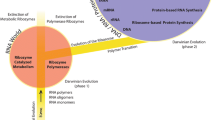Abstract
Ribosome-catalyzed peptide bond formation is a crucial function of all organisms. The ribosome is a ribonucleoprotein particle, with both RNA and protein components necessary for the various steps leading to protein biosynthesis. Evolutionary theory predicts an early environment devoid of complex biomolecules, and prebiotic peptide synthesis would have started in a simple way. A fundamental question regarding peptide synthesis is how the current ribosome-catalyzed reaction evolved from a primitive system. Here we look at both prebiotic and modern mechanisms of peptide bond formation and discuss recent experiments that aim to connect these activities. In particular, RNA can facilitate peptide bond formation by providing a template for activated amino acids to react and can catalyze a variety of functions that would have been necessary in a pre-protein world. Therefore, RNA may have facilitated the emergence of the current protein world from an RNA or even prebiotic world.
Similar content being viewed by others
Author information
Authors and Affiliations
Corresponding authors
Additional information
Received 4 December 2003; received after revision 13 January 2004; accepted 15 January 2004
Rights and permissions
About this article
Cite this article
Tamura, K., Alexander, R.W. Peptide synthesis through evolution. CMLS, Cell. Mol. Life Sci. 61, 1317–1330 (2004). https://doi.org/10.1007/s00018-004-3449-9
Issue Date:
DOI: https://doi.org/10.1007/s00018-004-3449-9



